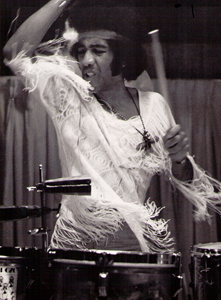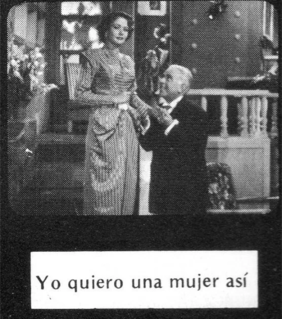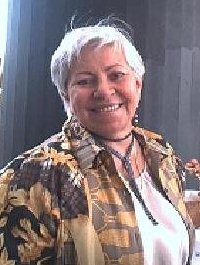Related Research Articles

Yoseph Alicia Machado Fajardo is a Venezuelan-American actress, TV host, singer and beauty queen who was Miss Venezuela 1995 and then Miss Universe 1996. She was the fourth woman from Venezuela to be named Miss Universe.

Alberto Naranjo [nah-rahn'-ho] was a Venezuelan musician. His mother, the singer Graciela Naranjo, was a radio, film and television pioneer in her homeland. Largely self-taught, Naranjo embarked on a similar musical course, becoming – like his mother – one of Venezuela's icons of contemporary popular music.

Doña Bárbara is a novel by Venezuelan author Rómulo Gallegos, first published in 1929. It was described in 1974 as "possibly the most widely known Latin American novel".

María Rivas was a Venezuelan Latin jazz singer, composer, and painter.
Pynchas Brener (1931) is the Ashkenazi Chief Rabbi of Caracas, Venezuela, starting in 1967. He received his Bachelor of Arts and Rabbinic Ordination from Yeshiva University and his Master's degree from Columbia University, and is a PhD honoris causa of Bar Ilan University.

William Henry Phelps Sr. was an American ornithologist and businessman. One of his sons, William H. Phelps Jr., was also an ornithologist, and collaborated with him. William Phelps was the founder of the William Phelps Ornithological Collection, located in Sabana Grande. This is still the most important private ornithological collection of the world.

Benjamín Brea was a Spanish-born Venezuelan musician, arranger and teacher, mostly associated with jazz, even though he had the advantage to play several music genres in various bands as a soloist as well as sideman and conductor.

Rubén Cedeño, is a Venezuelan musician, composer, painter, writer and speaker on metaphysical subjects. He was a disciple of Conny Méndez, who in 1946 founded the Metaphysical Teachings in Venezuela. He was one of her students and they had a very close relationship based on the teachings and their friendship as well. Rubén Cedeño has been writing and speaking publicly on Metaphysics for many years and as a result of his efforts, he founded or inspired the foundation of metaphysical groups in Argentina, Venezuela, Colombia, Chile, Uruguay, Paraguay, Ecuador, Bolivia, El Salvador, Peru, Mexico, Panama, United States, Spain, Italy, France, Belgium and Switzerland. He wrote more than 300 books, some of which have been translated to English, Italian, French and Portuguese and hold a place in many national libraries, such as Library of Alexandria, Egypt, Library of the Congress, National Library of Spain, Jewish National and University Library, National Library of Italy. His core message can be summarized in positive thinking, self-knowledge, the Inner Christ, the Seven Aspects of God, forgiveness practice and compassionate love. Rubén Cedeño holds a place in the Encyclopedic Music of Venezuela and he is among the most famous musicians of Venezuela. He graduated from the Conservatory of Music "Juan Manuel Olivares" in Caracas, Venezuela as a Professor of Singing. In Hungary, he specialized in Kodaly method and composed the Hungarian merengue "Having Chereznye Palinka". As composer of folk and infantile music the most recognized works are: The Aguinaldo Que Navidad part of the Venezuelan Christmas repertoire and interpreted by the mezzosoprano Morella Muñoz, Cantata infantil Simón Bolívar, Misa de Mi Tierra among others. It was National Prize of popular music of the INAVI with his valse Nora. The hymn Hail to the Statue of Liberty, received the congratulation of President Ronald Reagan.

Jacques Braunstein was a Venezuelan musician, economist, publicist and disc jockey.
Eleonora Bruzual is a Venezuelan writer and journalist. She authored with her husband, José Luis Uzcátegui, a Venezuelan psychiatrist and anthropologist, Militaries: heroes or cowards and The Men Who Eroticized Fidel. As a journalist, she contributes to El Nacional, Diario Las Americas and El Nuevo Herald, has a daily radio segment called "Trinchera" on Radio Mambí of Miami (Florida) and is the editor of an information portal called Gentiuno.

Héctor José Regalado was a Venezuelan Latin music bandleader, percussionist, composer and educator. He played professionally under the name Rudy Regalado.

Nueva Cádiz is an archaeological site and former port town on Cubagua, off the coast of Venezuela. First established in 1500 as a seasonal settlement, by 1515 it had become a year-round permanent town. it was one of the first European settlements in the Americas. The settlement was given the name Nueva Cádiz when it was incorporated as a city in 1528.
Rosalinda Raquel Serfaty Rosenstock is an Argentine-born Venezuelan television and theater actress of Moroccan Jewish and Berber Moroccan origin.
Jacobo Penzo, is a Venezuelan filmmaker, best known for his drama piece The House of Water, shown in the Directors' Fortnight section of the Cannes Film Festival in 1984. The film also represented Venezuela in the Best Foreign Language Film competition at the 57th Academy Awards. Penzo is also a painter and a writer.

That's the Woman I Want is a 1950 Venezuelan-Argentine comedy film directed by Juan Carlos Thorry and starring Olga Zubarry, Francisco Álvarez, Héctor Monteverde and Amador Bendayán. It was Thorry's directorial debut, though he had gone to Venezuela to act, and was commercially successful. The film has been analyzed as part of Venezuelan film history, in particular by Central University of Venezuela academic María Gabriela Colmenares.

Lucila Luciani de Pérez Díaz was a Venezuelan historian, musician and feminist. She was the first woman Director of the Teacher's Normal School, served as the librarian of the Ministry of Foreign Affairs and became the Deputy Director of the National Library. She was the first woman inducted into the National Academy of History and was Venezuela's delegate for the inaugural body of the Inter-American Commission of Women. She was one of the founders of the feminist movement in Venezuela and published the feminist magazine Iris.
Susana Rotker was a Venezuelan journalist, columnist, essayist, and writer.

Irma Contreras is a former dancer, choreographer, and ballet teacher. She is part of the 1940s generation of Venezuelan dancers. She created and founded the National Ballet of Venezuela with her sister Margot Contreras.
Elias Mocatta (1798–1881) was a British merchant and financier, significant in the early credit history of Venezuela and other South American countries.
References
- ↑ The Scroll and the Cross: 1,000 Years of Jewish-Hispanic Literature– Ilan Stavans. Alicia Freilich: Recollections of a Criolla Zionist, pp. 250–256. Joan E. Friedman (English translation). Publisher: Routledge, Great Britain, 2002. Format: Paperback, 336 pp. Language: English. ISBN 978-0-415-92931-8
- ↑ Encuentro y alteridad. Vida y cultura judía en América Latina – Judit Bokser Liwerant, Alicia Gojman Backal, Hellen B. Soriano. Alicia Freilich Segal, pp 638. Publisher: Fondo de Cultura Económica, México, 1999. Format: Paperback, 758 pp. Language: Spanish. ISBN 968-16-5983-X
- 1 2 3 The Scroll and the Cross
- 1 2 Encuentro y alteridad
- ↑ Ideas de Babel – Alicia Freilich folder
- ↑ Cuarta Dimensión – Alicia Freilich de Segal. Publisher: Síntesis Dosmil, Caracas, 1975. Format: Paperback, 79 pp. Language: Spanish. Open Library OL4044142M
- ↑ En clave sexymental: Aldemaro Romero a medio siglo creativo – Alicia Freilich. Publisher: Editorial Comala, Caracas, 2006. Format: Paperback, 130 pp. Language: Spanish. ISBN 980-390-144-3
- ↑ Entrevistados en carne y hueso – Alicia Freilich de Segal. Publisher: Librería Suma, Caracas,1998. Format: Hardcover, 320 pp. Language: Spanish. Open Library OL4173103M
- ↑ Ilan Chester es verdad – Alicia Freilich. Publisher: Alfa Grupo Editorial, Instituto Cultural Venezolano Israeli, Caracas, 2004. Format: Hardcover, 121 pp. Language: Spanish. ISBN 980-354-142-0
- ↑ La Venedemocracia – Alicia Freilich de Segal. Publisher: Monte Avila Editores, Caracas, 1978. Format: Paperback, 79 pp. Language: Spanish. Open Library OL4758825M
- ↑ Legítima defensa – Alicia Freilich de Segal. Publisher: Publicaciones Seleven, Caracas, 1984. Format: Paperback, 145 pp. Language: Spanish. Open Library OL2982533M
- ↑ Triálogo, Notas de crítica urgente – Alicia Freilich de Segal. Publisher: Editorial Nuevo Tiempo, Caracas, 1973. Format: Paperback, 233 pp. Language: Spanish. Open Library OL4045398M
- ↑ Cláper – Alicia Freilich de Segal. Publisher: Editorial Planeta, Caracas, 1987. Format: Paperback, 176 pp. Language: Spanish. ISBN 980-271-035-0
- ↑ Cláper – Alicia Freilich de Segal. Publisher: University of New Mexico Press, 1998. Format: Hardcover, 196 pp. Language: English. ISBN 0-8263-1854-1
- ↑ Colombina Descubierta – Alicia Freilich. Publisher: Editorial Planeta, Caracas, 1991. Format: Paperback, 117 pp. Language: Spanish. ISBN 980-271-158-6
- ↑ Vieja verde – Alicia Freilich. Publisher: Edited by demand, Caracas, 2000. Format: Paperback, 155 pp. Language: Spanish. ISBN 980-6478-05-3